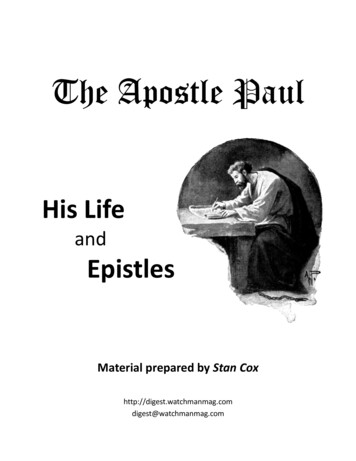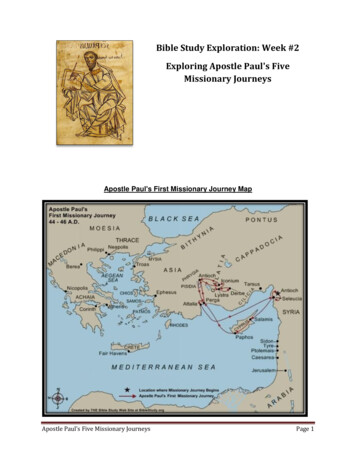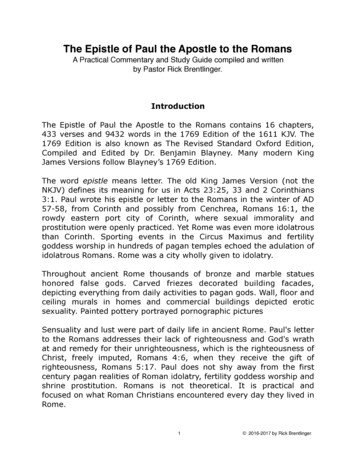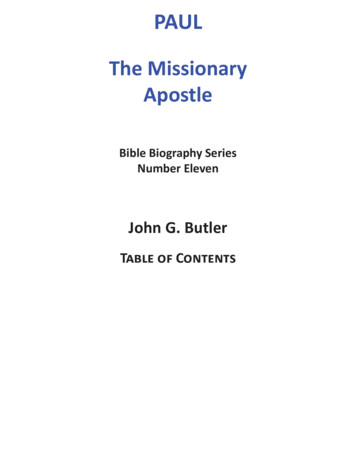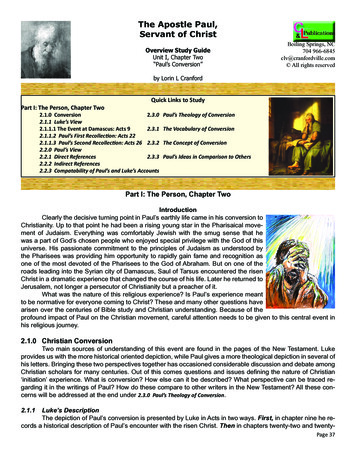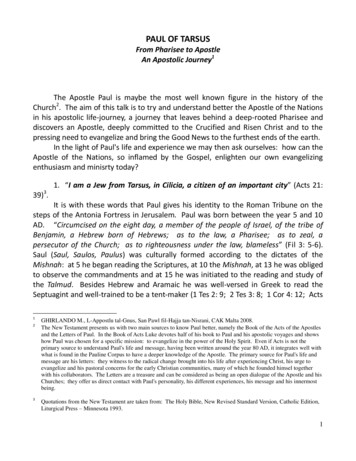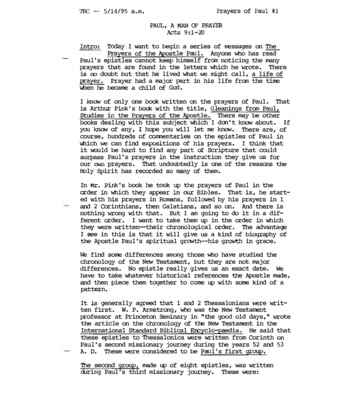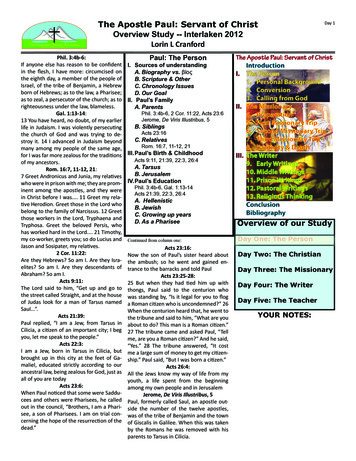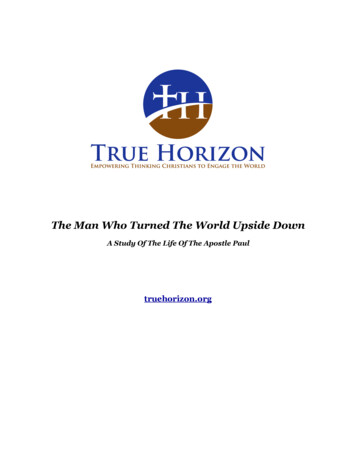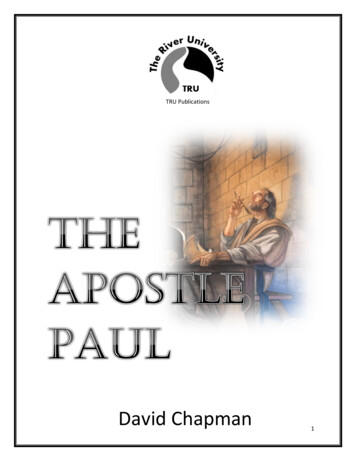
Transcription
TRU PublicationsDavid Chapman1
Table of ContentsPaul the Persecutor. 3Paul's Conversion . 6Separation to Apostleship. 11Paul's Missionary Journeys . 13The Writings of an Apostle. 16The Hardships of an Apostle . 172
NotesThe Apostle PaulThe Apostle Paul was a pattern-setter for all times. His ministryimpacted the entire world with the gospel of Jesus Christ. Thisformer Christian- persecuting-Pharisee turned apostle turned theworld upside down. His apostleship was unequaled, even by thetwelve. Having wrote over half of the New Testament, hisministry is still alive today as believers everywhere study hiswritings, which were divinely inspired by the Holy Spirit.II Timothy 3:16-17All scripture is given by inspiration of God, and isprofitable for doctrine, for reproof, for correction, forinstruction in righteousness: That the man of God maybe perfect, thoroughly furnished unto all good works.To understand Paul's ministry and apostleship it is necessary tounderstand Paul the man. To do this, Paul's background andreligious history must be examined. Therefore, this section willbe devoted to Paul's personal history prior to his conversion.This will be of great value in understanding how God, in Hissovereignty, used Paul's history to shape his future as an apostle.Paul the PersecutorPaul, whose Jewish name was Saul, was of pure Jewish descent,of the tribe of Benjamin. He was a Hebrew of the Hebrews as hestated in Philippians chapter three:Philippians 3:5-6Circumcised the eighth day, of the stock of Israel, of thetribe of Benjamin, an Hebrew of the Hebrews; astouching the law, a Pharisee; Concerning zeal,persecuting the church; touching the righteousness3
which is in the law, blameless.NotesPaul was a Pharisee, as was his father (Acts 23:6). Pharisees wereseparatists, which is the meaning of the word "Pharisee." Theirorigin came about during the period of time between the OldTestament and the New Testament, commonly referred to as the“silent years.” The silence is in reference to Scripture. Duringthis period two religious parties developed from the ranks of thepriests and scribes. The Sadducean party arose from the order ofpriests and the Pharisees from the scribes. While the Sadduceeswere concerned primarily with social position, the Phariseesdedicated themselves to legalistic views. Ceremonial law was thepassion of every Pharisee. It was under this influence that Paulwas brought up.Jesus denounced the hypocritical practices of the Pharisees in Hisministry. Their religion was an outward show, but inside, theirhearts were far from God. When questioned by the Phariseesabout not keeping the tradition of the elders, Jesus respondedwith complete denunciation (Mark 7:6-9, 13). Jesus preached asermon against Phariseeism in Matthew chapter 23. Below is alist of names that our Lord referred to them as, in just onesermon! Hypocrites (w. 13, 14, 15, etc.)Child of Hell (v. 15)Blind Guides (v. 16)Fools (v. 17)Whited Sepulchres (v. 27)Serpents (v. 33)Vipers (v. 33)Remember, these were the religious leaders of the day.Pharisees were very proud of their outward observance of thelaw, but Jesus could see straight through their feigned piety.Though Jesus denounced the Pharisees as a sect, this is not tosay that every Pharisee intentionally rejected God. Surely therewere some who were sincerely trying to serve God, howeversincerely wrong they were. It is of this category that Paul fit into.Being raised in Tarsus of Cilicia, Paul went to Jerusalem at theage of about 13 to further his studies. There he studied at thefeet of Gamaliel, a distinguished and prominent teacher of the4
Noteslaw (Acts 22:3). From his youth, Paul was zealous with the thingsof God. His spiritual blindness prevented him from seeing thereality of his true spiritual state. He sought to please God with anoutward observance of God's law.Paul's introduction to New Testament readers is in connectionwith Stephen’s stoning in Acts 7:58: And cast him out of the city,and stoned him: and the witnesses laid down their clothes at ayoung man's feet, whose name was Saul. At this time Paul wasprobably about thirty years of age. Paul supervised the firstmartyr of the Christian Church. Jesus warned the disciples thatthere would be those who persecuted them as doing service toGod:John 16:2-3They shall. put you out of the synagogues: yea, the timecometh, that whosoever kills you will think that he does Godservice. And these things will they do unto you, because theyhave not known the Father, nor me.Because they have not known the Father, nor me: this was Paul'spredicament. He was advancing up the religious ladder bypersecuting the thing that most threatened the existence of theirelite religious sect: Christianity. As for Saul, he made havoc ofthe church, entering into every house, and haling men andwomen committed them to prison (Acts 8:3). After hisconversion, Paul made these statements in regards to hispersecution of the Church:Acts 22:4And I persecuted this way unto the death, binding anddelivering into prisons both men and women.Acts 26.9-11I verily thought with myself, that I ought to do manythings contrary to the name of Jesus of Nazareth. Whichthing I also did in Jerusalem: and many of the saints did Ishut up in prison, having received authority from thechief priests; and when they were put to death, I gavemy voice against them. And I punished them oft inevery synagogue, and compelled them to blaspheme;and being exceedingly mad against them, I persecutedthem even unto strange cities.5
NotesPaul's ConversionJust prior to his conversion, Paul went to the high priest himselfand requested letters of authority to go to Damascus and arrestany Christians he found there (Acts 9:1-2). Having his requestgranted, Paul began his journey to Damascus. Little did he knowwhat this journey had in store for him.Acts 9:3-9As he journeyed he came near Damascus, and suddenlya light shone around him from heaven. Then he fell tothe ground, and heard a voice saying to him, “Saul, Saul,why are you persecuting Me?” And he said, “Who areYou, Lord?” Then the Lord said, “I am Jesus, whom youare persecuting. It is hard for you to kick against thegoads.” So he, trembling and astonished, said, “Lord,what do You want me to do?” Then the Lord said tohim, “Arise and go into the city, and you will be toldwhat you must do.” And the men who journeyed withhim stood speechless, hearing a voice but seeing no one.Then Saul arose from the ground, and when his eyeswere opened he saw no one. But they led him by thehand and brought him into Damascus. And he wasthree days without sight, and neither ate nor drank.Paul had been apprehended by Jesus Himself. This is wherePaul's motivation for his persecution of saints comes to light.Paul is instantly humbled and says: Lord what will You have meto do? Instructions were given to go into the city and wait. Forthree days Paul was there without sight, food and drink. Imaginethe contemplations going through his mind. Everything he haddedicated himself to was exposed as lie! Deep humbling wasupon this once proud Pharisee of Pharisees. The light of JesusChrist had driven him to his knees. This "great" leader now hadto be lead by the hand. God's sovereignty was at work.A Chosen VesselIn the city of Damascus there was a certain disciple namedAnanias. While Paul was praying he had a vision of this man6
Notescoming in and laying hands on him to receive his sight (v. 12).However, Ananias had heard of Paul's persecution against theChurch. Upon his certainty that God was indeed talking to him,Ananias received this message for Paul:Acts 9:15-16But the Lord said to him, “Go, for he is a chosen vesselof Mine to bear My name before Gentiles, kings, and thechildren of Israel. 16 For I will show him how manythings he must suffer for My name’s sake.”Paul was a "chosen vessel." Paul's apostleship was appointedbefore the foundations of the world. Paul had been uniquelyqualified for his apostleship to the Gentiles through hisupbringing as a Roman citizen living in a Greek speaking city.Paul was essentially a man of two worlds – the Hebrew and theGreek. He had been trained in the law of God, and at the sametime been educated in Greek and Roman culture. It is imperativefor an apostle to know and understand the culture of those towhom he is sent.Gentiles, who were once strangers and foreigners to thecovenants of promise (Eph. 2:12), needed to be reached with thegospel of Jesus Christ. It would take an extraordinary man tobridge the gap between the Jew and the Gentile. Paul was thatunique man. Paul was a man who was Jewish in every way, tothe core of his being. However, he was also a man that knew andunderstood the Greeks and the Romans like few Jews did. And,vital to his apostleship, he was a Roman citizen. Access was histo the great Roman Empire, to preach the gospel with liberty.His greatest obstacle was to be from his own people, not Rome.Paul was a chosen vessel. What exactly did Ananias mean whenhe told Paul that God had called him as a chosen vessel? Later,in Paul's preachings, he looks back on that divine encounter:Acts 22:14-15Then he said, ‘The God of our fathers has chosen youthat you should know His will, and see the Just One, andhear the voice of His mouth. For you will be His witnessto all men of what you have seen and heard.From that moment forth Paul began to a) know God's will; b) seethat Just One; c) hear God's voice; and d) witness unto all men.7
NotesA divine calling is the prerequisite for any five-fold ministry.Paul's life had been apprehended by God; he was no longer hisown, but the property of Jesus – his newfound Lord!Paul immediately began to preach and testify that Jesus was theSon of God:Acts 9:20-22Immediately he preached the Christ[c] in thesynagogues, that He is the Son of God. Then all whoheard were amazed, and said, “Is this not he whodestroyed those who called on this name in Jerusalem,and has come here for that purpose, so that he mightbring them bound to the chief priests?” But Saulincreased all the more in strength, and confounded theJews who dwelt in Damascus, proving that this Jesus isthe Christ.A mighty anointing was upon Paul's life, even in the baby-stagesof his Christian walk. That anointing amazed those who heardhim. They could not believe that this was the same Saul of Tarsusthat persecuted the Church. In fact it was not! Paul had beentransformed into a new man. What better candidate could theHoly Spirit find to pen the inspired words: Therefore if any manbe in Christ, he is a new creature: old things are passed away;behold, all things are become new (II Corinthians 5:17).At this point, Paul could have had a dynamic ministry just givinghis testimony. Had Paul never deepened his revelation of Jesushe still would have had an outwardly successful ministry. ButPaul had been called as an apostle before the foundations of theworld (cf. Jer. 1:5). The apostolic call requires more than a goodtestimony, or even a good understanding of Scripture, whichPaul certainly had. There are two fundamental requirements forapostleship: 1) a history with God – experiential knowledge;and 2) revelation knowledge of the Lord Jesus Christ. Paul hadneither, but that was all about to change.8
NotesThe Revelation YearsGalations 1:11-18But I make known to you, brethren, that the gospelwhich was preached by me is not according to man. For Ineither received it from man, nor was I taught it, but itcame through the revelation of Jesus Christ. For youhave heard of my former conduct in Judaism, how Ipersecuted the church of God beyond measure and triedto destroy it. And I advanced in Judaism beyond manyof my contemporaries in my own nation, being moreexceedingly zealous for the traditions of my fathers. Butwhen it pleased God, who separated me from mymother’s womb and called me through His grace, toreveal His Son in me, that I might preach Him among theGentiles, I did not immediately confer with flesh andblood, nor did I go up to Jerusalem to those who wereapostles before me; but I went to Arabia, and returnedagain to Damascus. Then after three years I went up toJerusalem to see Peter, and remained with him fifteendays.For three years Paul did not confer with flesh and bloodregarding his experience. On the backside of the desert, Paulreceived revelation knowledge from the Lord Jesus Himself. Thisoccurred partially through visitations of the exalted Lord, andpartially through the person of the Holy Spirit. God was unfoldingto Paul the message of the New Covenant. Hidden and tuckedaway in the pages of the Old Testament were the glorious truthsof the New. Like no other apostle, Paul was able to extract theseweighty revelations from the Law and the Prophets.Revelation knowledge is a prerequisite to apostleship. Withoutit, one only has book knowledge , which is incapable ofdestroying the yokes of bondage. Paul had such powerfulrevelation that at times he would refer to the gospel as "mygospel." In the day when God shall judge the secrets of men byJesus Christ according to my gospel. (Romans 2:16)Now to him that is of power to stablish you according to9
Notes my gospel. (Romans 16:25)Remember that Jesus Christ of the seed of David wasraised from the dead according to my gospel. (2 Timothy2:8)When Paul went up to Jerusalem, fourteen years after hisconversion, he was confident in the revelation God had givenhim. His apostleship had covered four years and his firstmissionary journey (Acts chapters 13 and 14). Paul wrote, thatthere was nothing that the apostles at Jerusalem could add to hisrevelation:Galations 2:6But from those who seemed to be something—whatever they were, it makes no difference to me; Godshows personal favoritism to no man—for those whoseemed to be something added nothing to me.10
NotesSeparation to ApostleshipActs 13:1-4Now in the church that was at Antioch there werecertain prophets and teachers: Barnabas, Simeon whowas called Niger, Lucius of Cyrene, Manaen who hadbeen brought up with Herod the tetrarch, and Saul. Asthey ministered to the Lord and fasted, the Holy Spiritsaid, “Now separate to Me Barnabas and Saul for thework to which I have called them.” Then, having fastedand prayed, and laid hands on them, they sent themaway. So, being sent out by the Holy Spirit, they wentdown to Seleucia, and from there they sailed to Cyprus.Paul received his separation to apostleship some ten years afterhis conversion (AD 45). Up to this point he had been functioningin the office of prophet and teacher. The call to apostleship wasalways there but the time for separation to that call hadn'tarrived. It is almost certain that Paul had revelation of thiscalling, but he did not take the office upon himself without divineorder. Part of divine order is confirmation from the Body.This is likened unto David in the Old Testament. David wasanointed King by the prophet Samuel (I Sam. 16), yet Saul stillstood in the office of King. David had opportunity to kill Saul andusurp the throne, but he would not take the throne withoutdivine order. In fact, it was many years before David was madeKing over Israel. Those years were full of suffering andmisunderstanding. But through it all God made that littleshepherd boy into a King. After Saul's death, the privateanointing that took place so many years prior was made publicby the confirmation of the people: And the men of Judah came,and there they anointed David king over the house of Judah (IISam. 2:4a).When was David King? Was it at God's anointing or the people'sanointing? The first may be seen as calling, the latter separation.Did God one day decide to make Paul an apostle, or was hepredestined from his mother's womb? Paul answers thatquestion in his epistle to the Galations:Paul, an apostle, (not of men, neither by man, but by11
NotesJesus Christ, and God the Father. But when it pleasedGod, who separated me from my mother's womb, andcalled me by his grace. (Galations 1:1, 15).The calling to apostleship most likely was revealed to Paul in theearly years when he was in Arabia receiving revelation fromJesus for the space of three years (Gal. 1:16-18). However, aswith David, that call needed time for development andconfirmation. When the Holy Ghost spoke at Antioch it was inthe presence of all the church leadership. Upon receiving thismessage, the church at Antioch confirmed Paul and Barnabas’apostolic calling and laid hands upon them: and when they hadfasted and prayed, and laid their hands on them, they sent themaway (Acts 13:3). Thus, apostolic calling requires confirmationfrom church leadership, even more so than any other ministry. Ifone has received the call, he must humble himself under God'smighty hand until the due season of confirmation and separation(see I Pet. 5:6).12
NotesPaul's Missionary JourneysMissionary work is central to the life of an apostle. Not allmissionaries are apostles, other qualifications must be met. Notall apostles are missionaries, per say. That is, an, apostle will domissionary work, but not necessarily be a missionary. Paul wasnot just a missionary, but it was the most outstanding aspect ofhis ministry. Paul took three major missionary journeys in hislife.First Missionary JourneyAfter being separated as an apostle, along with Barnabas, in Actschapter 13, Paul set out on his first missionary journey. Barnabasand John Mark were his companions and co-workers. Early on,Barnabas was mentioned first in the team, but after a while Paulwas spoken of first. An obvious indication of Paul's leadership asthe head of their apostolic team.Early church ministry was done by apostolic teams. This beganwith Jesus sending out the seventy, two by two (Luke 10:1).However, on Paul’s team, John Mark got homesick during theirtravels and returned home. This would later be a point ofcontention that would break up this apostolic team.During the two-and-one-half-year missionary journey (spring of47 A.D. to. fall of 49 A.D.), Paul and Barnabas made disciples,built churches and trained leaders in the following places:a.b.c.d.e.f.SeleuciaIsland of Cyprus (struck sorcerer blind)PergaAntioch of PisidiaIconiumLystra (crippled man healed; Paul stoned and left fordead)g. DerbeAfter completing these stops, Paul and Barnabas went back toeach of these new churches and followed up on their work.Acts 14:21-2313
NotesAnd when they had preached the gospel to that city andmade many disciples, they returned to Lystra, Iconium,and Antioch, strengthening the souls of the disciples,exhorting them to continue in the faith, and saying, “Wemust through many tribulations enter the kingdom ofGod.” So when they had appointed elders in everychurch, and prayed with fasting, they commended themto the Lord in whom they had believed.Ordaining elders is an important function of apostles. They didn'tperform this function on their first trip through. Time wasneeded to develop the qualities and characteristics that werenecessary. Those who had distinguished themselves as leaderswere set apart to lead these new congregations, under thesupervision of the apostolic team, and more specifically, Paul.After this lengthy, prosperous apostolic journey which spreadover 1,200 miles, Paul and Barnabas returned to Antioch, theirhome church. Regardless of how large and successful Paul'sministry became, he never saw himself as being above, or betterthan being accountable.Acts 14:26-28From there they sailed to Antioch, where they had beencommended to the grace of God for the work whichthey had completed. Now when they had come andgathered the church together, they reported all thatGod had done with them, and that He had opened thedoor of faith to the Gentiles. So they stayed there along time with the disciples.Second Missionary JourneyAfter a Church Council at Jerusalem (Acts chapter 15), Paulbegan to feel the stir once again to visit the newly formedchurches he had founded. When the Word said that Paul andBarnabas "abode long time" at Antioch, it is estimated that it wastwo years. Antioch was a training center among churches. Paul'sleadership skills were put to good use. But the call to return tothe mission field stirred his nest.However, tThe contention was so strong between Paul andBarnabas regarding John Mark, that they parted ways: And thecontention was so sharp between them, that they departed14
Notesasunder one from the other (Acts 15:39).Paul chose Silas as his new partner and received the blessing ofthe brethren (Acts 15:40). They set out on Paul's secondmissionary journey which is spoken of in Acts 15:36-18:22. Theyvisited the following places:a.b.c.d.e.f.g.h.i.j.SyriaCiliciaDerbeLystra (Timothy joins team)Troas (Paul receives vision)Philippi (beaten and jailed; first European church)ThessalonicaBereaAthensCorinth (joined by Aquilla and Priscilla; stayed at Corinth18months)k. EphesusOnce again Paul returned to Antioch, his home church and spenttime there.Third Missionary JourneyActs 18:23-20:38 covers the third missionary journey of Paul.Once again, Paul began by retracing his steps to visit thechurches he had founded. He immediately set out for Ephesus.Paul stayed at Ephesus for over three years, building the church.The following are the places Paul went to on his third piTroasMiletusThe three journeys covered a period of twelve years. Paul wasused by God to establish churches in the majority of the cities inAsia Minor and Greece.15
NotesThe Writings of an ApostlePaul wrote a total of thirteen epistles, fourteen if you countHebrews (no author named). These epistles were later canonizedas being divinely inspired as Holy Scripture. Paul wrote to thenewly founded churches across Greece and Asia Minor, as wellas Rome. There were many issues in the early Church thatneeded addressed. As an apostle, Paul wrote as a spiritualfather, caring for his children.Winds of doctrine were blowing through these churches. Falseteachers were on the prowl, seeking to devour these newconverts. Paul's writings were passed from church to church as acompass to keep them on the right track.Today, we are blessed to have the writings of the greatestapostle to ever live. The Pauline revelation is the heart of theNew Testament. He brought the deep truths of God out in anunderstandable way. Paul was a master of the Greek language.He could have written in classical Greek, but instead chose KoineGreek, the language of the people. Though easy to understand,Paul's writings were weighty and hard to discern without theHoly Spirit's help. Listen to Peter's words concerning Paul'swritings:2 Peter 3:15-16And consider that the longsuffering of our Lord issalvation—as also our beloved brother Paul, accordingto the wisdom given to him, has written to you, as alsoin all his epistles, speaking in them of these things, inwhich are some things hard to understand, whichuntaught and unstable people twist to their owndestruction, as they do also the rest of the Scriptures.Though apostles today cannot write divinely inspired Scripture, itis still vital for an apostle to weld the power of the pen. Histeachings and testimony should be recorded for the continuingblessing of generations to come.16
NotesThe Hardships of an ApostleThe book of 2 Corinthians offers us a unique peer into thepersonal life and hardships of the apostle Paul. It was extremelydifficult for the apostle to the Gentiles. But God was alwaysfaithful to deliver him in times of trouble. Let him who thinksapostleship is an easy road, one to be desired, consider thefollowing from just one of Paul's epistles, 2 Corinthians:For we do not want you to be ignorant, brethren, of ourtrouble which came to us in Asia: that we wereburdened beyond measure, above strength, so that wedespaired even of life. (2 Corinthians 1:8)We are hard-pressed on every side, yet not crushed; weare perplexed, but not in despair; persecuted, but notforsaken; struck down, but not destroyed (2 Corinthians4:8-9)In stripes, in imprisonments, in tumults, in labors, insleeplessness, in fastings; by purity, by knowledge, bylongsuffering, by kindness, by the Holy Spirit, by sincerelove (2 Corinthians 6:5-6)For indeed, when we came to Macedonia, our bodieshad no rest, but we were troubled on every side.Outside were conflicts, inside were fears. (2 Corinthians7:5)Are they ministers of Christ?—I speak as a fool—I ammore: in labors more abundant, in stripes abovemeasure, in prisons more frequently, in deaths often.From the Jews five times I received forty stripes minusone. Three times I was beaten with rods; once I wasstoned; three times I was shipwrecked; a night and aday I have been in the deep; in journeys often, in perilsof waters, in perils of robbers, in perils of my owncountrymen, in perils of the Gentiles, in perils in the city,in perils in the wilderness, in perils in the sea, in perilsamong false brethren; in weariness and toil, insleeplessness often, in hunger and thirst, in fastingsoften, in cold and nakedness— besides the other things,17
Noteswhat comes upon me daily: my deep concern for all thechurches. (2 Corinthians 11:23-28)And lest I should be exalted above measure by theabundance of the revelations, a thorn in the flesh wasgiven to me, a messenger of Satan to buffet me, lest I beexalted above measure. (2 Corinthians 12:7)Paul's hardships served only to make him greater. Some say thathe had to suffer because he had no faith. This is ridiculousthinking. Paul did not operate in the "cadillac faith" that somemodern prosperity preachers teach. Paul was a living example offaith in everything he did. Paul was the greatest apostle of allbecause he made himself the least. The following passageportrays the heart of Paul throughout his life, ministry, and deathas a martyr:Phillipians 3:7-14But what things were gain to me, these I have countedloss for Christ. Yet indeed I also count all things loss forthe excellence of the knowledge of Christ Jesus my Lord,for whom I have suffered the loss of all things, andcount them as rubbish, that I may gain Christ and befound in Him, not having my own righteousness, whichis from the law, but that which is through faith in Christ,the righteousness which is from God by faith; that I mayknow Him and the power of His resurrection, and thefellowship of His sufferings, being conformed to Hisdeath, if, by any means, I may attain to the resurrectionfrom the dead. Not that I have already attained, or amalready perfected; but I press on, that I may lay hold ofthat for which Christ Jesus has also laid hold of me.Brethren, I do not count myself to have apprehended;but one thing I do, forgetting those things which arebehind and reaching forward to those things which areahead, I press toward the goal for the prize of theupward call of God in Christ Jesus.18
The Apostle Paul The Apostle Paul was a pattern-setter for all times. His ministry impacted the entire world with the gospel of Jesus Christ. This former Christian- persecuting-Pharisee turned apostle turned the world upside down. His apostleship was unequaled, even by the twelve. Having wrote over half of the New Testament, his
